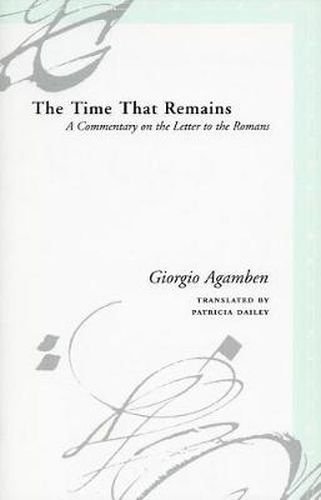Readings Newsletter
Become a Readings Member to make your shopping experience even easier.
Sign in or sign up for free!
You’re not far away from qualifying for FREE standard shipping within Australia
You’ve qualified for FREE standard shipping within Australia
The cart is loading…






In The Time That Remains, Agamben seeks to separate the Pauline texts from the history of the Church that canonized them, thus revealing them to be the fundamental mession nic texts of the West. He argues that Paul’s letters are concerned not with the foundation of a new religion but rather with the messianic abolition of Jewish law. Situating Paul’s texts in the context of early Jewish messianism, this book is part of a growing set of recent critiques devoted to the period when Judaism and Christianity were not yet fully distinct, placing Paul in the context of what has been called Judaeo-Christianity. Agamben’s philosophical exploration of the problem of messianism leads to the other major figure discussed in this book, Walter Benjamin. Advancing a claim without precedent in the vast literature on Benjamin, Agamben argues that Benjamin’s philosophy of history constituies a repetition and appropriation of Paul’s concept of remaining time. Through a close reading and comparison of Benjamin’s Theses on the Philosophy of History and the Pauline Epistles, Agamben discerns a number of striking and unrecognized parallels between the two works. Meridian: Crossing Aesthetics
$9.00 standard shipping within Australia
FREE standard shipping within Australia for orders over $100.00
Express & International shipping calculated at checkout
In The Time That Remains, Agamben seeks to separate the Pauline texts from the history of the Church that canonized them, thus revealing them to be the fundamental mession nic texts of the West. He argues that Paul’s letters are concerned not with the foundation of a new religion but rather with the messianic abolition of Jewish law. Situating Paul’s texts in the context of early Jewish messianism, this book is part of a growing set of recent critiques devoted to the period when Judaism and Christianity were not yet fully distinct, placing Paul in the context of what has been called Judaeo-Christianity. Agamben’s philosophical exploration of the problem of messianism leads to the other major figure discussed in this book, Walter Benjamin. Advancing a claim without precedent in the vast literature on Benjamin, Agamben argues that Benjamin’s philosophy of history constituies a repetition and appropriation of Paul’s concept of remaining time. Through a close reading and comparison of Benjamin’s Theses on the Philosophy of History and the Pauline Epistles, Agamben discerns a number of striking and unrecognized parallels between the two works. Meridian: Crossing Aesthetics